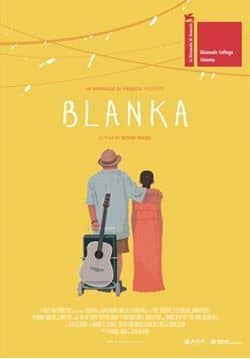Eye For Film >> Movies >> Blanka (2015) Film Review
Blanka
Reviewed by: Amber Wilkinson
_600.webp)
There have been stories about savvy street kids before, most notably set in the slums of India, from the colourful verve of Slumdog Millionnaire to the grittier action of Thanks Maa. Here the setting is Manila in the Philippines and the spirit adopted by debut Japanese director Kohki Hasei is one of fable and childhood resilience. His story may be simple but it is warm, unsentimental and has plenty to recommend it, particularly for older children who will be less familiar with the territory and who are likely to find themselves quickly rooting for its feisty heroine.
The eponymous orphan has an eye for an unguarded purse and a bravery born out of circumstances, which see her squirrelling away money and lingering at the window of the local school in between thefts to catch a glimpse of the lessons within. She has even dolled up her corner of the slum in a bid to make it homely, although as Hasei indicates by lingering shots of the mums that Blanka sees around the city, something is missing.

Shot mostly from Blanka's perspective, it's easy to see why she finds the music of local blind musician Peter (Peter Millari) attractive, and his non-judgemental, non-threatening attitude make a winning alternative to the pack of male street kids she's been hanging round with. She helps him raise cash more by begging while he plays and he, in an allegorical turn, helps her to find 'her voice'. What he doesn't know is that Blanka has hatched a plot to buy herself a mother - posting signs around the town offering 30,000 pesos for anyone who will take her in and making both of them a target for ne'er-do-wells in the process.
While the plot may hold little in the way of surprise, Hasei gives plenty of complexity to Blanka and gets a great performance from non-professional Cydel Gabutero, whose big singing voice comes as a delightful surprise, while the music throughout adds atmosphere and emotion. Bad things may happen to Blanka but she is never portrayed as simply a victim, nor does the director make her a saint - in keeping with the family feel of the film, lessons will be learnt. Hasei relegates the 'poverty porn' aspects of Manila in favour of focusing on the stoicism of his characters and the warm lensing from cinematographer Takeyuki Onishi helps to keep a sense of flow even when the action threatens to become rather choppy and episodic. Hasei comes from a documentary background and has an eye for a good image but has room to improve in terms of pacing. He could also trust his characters to carry the story a little more - it would be nice to learn more about what makes Peter tick and less incident would not make for a lesser film.
Blanka - one of the trio of Venice Film Festival Biennale College presentations this year - has already been picked up by a sales company and is likely to have a healthy festival future ahead, with Hasei showing the potential for more complex projects in future.
Blanka is available to watch until September 10 on Sala Web - which is screening 15 films from the Venice Film Festival, priced 4 euros each or 2 euros each if you buy a pass to see five or more.
Reviewed on: 08 Sep 2015
















